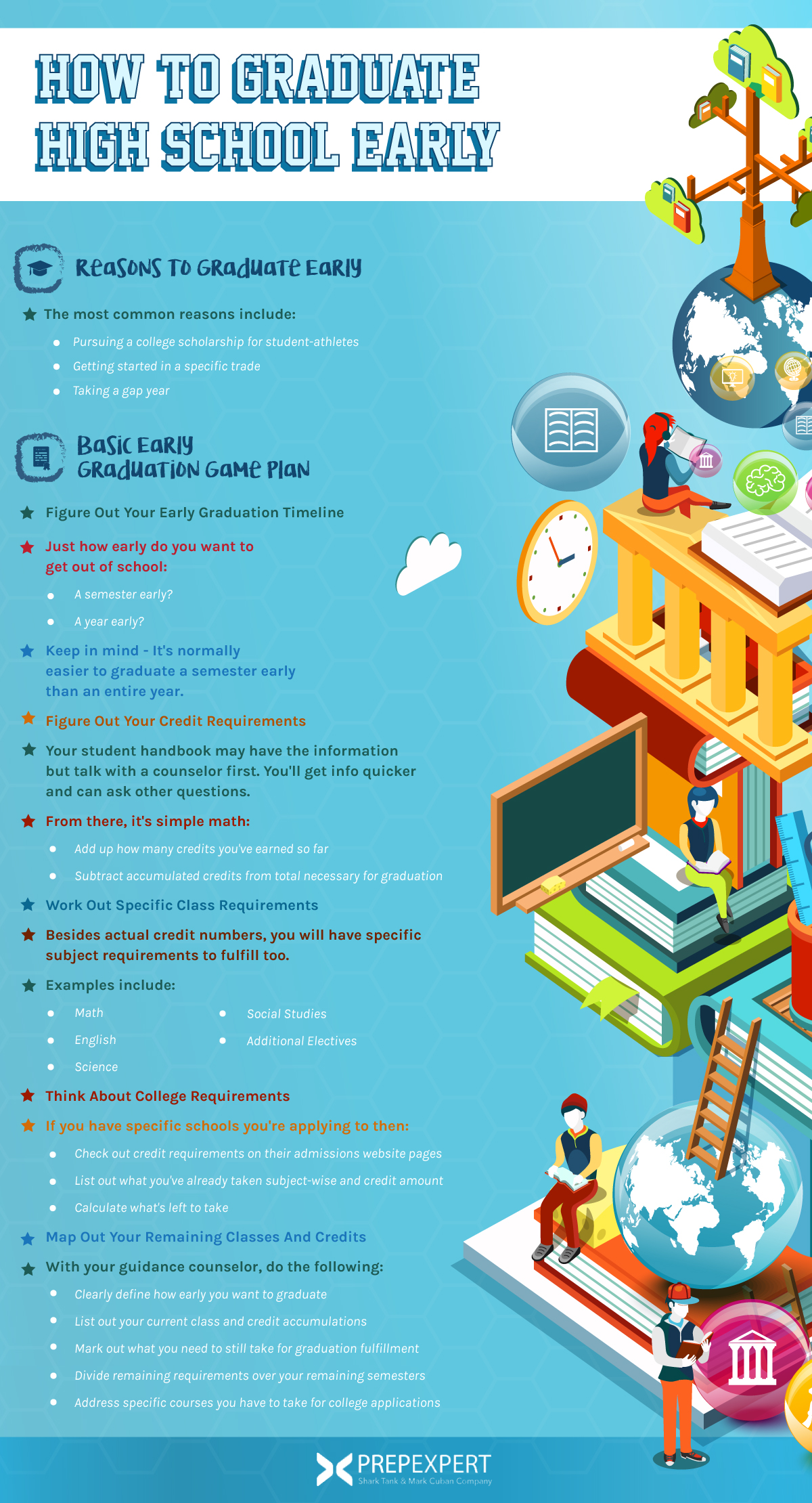How To Graduate High School Early
You’re probably asking yourself now, “how to graduate high school early?” Just like in college, it’s possible to graduate high school early with your diploma. It’s not easy because of how much hard work it takes, but it’s definitely possible.
Here’s the basic game plan on how to graduate high school early.
While still in high school, make the most of your standardized test scores with either our SAT prep or ACT prep classes now.
Reasons To Graduate Early
Crazy as it may sound, there are valid reasons to graduate early from high school.
The most common reasons include:
- Pursuing a college scholarship for student-athletes
- Getting started in a specific trade
- Taking a gap year
Whatever the reason, it’s important to know that it’s absolutely possible to graduate high school early.
Figure Out Your Early Graduation Timeline
The first step is figuring out how early you want to graduate.
Just how early do you want to get out of school:
- A semester early?
- A year early?
If you have a specific activity in mind after graduation, how long will that take to pursue before college? Keep this point in mind – It’s normally much easier to graduate a semester early than an entire year.
Don’t worry if you think that’s not enough time. If you graduate a semester early your senior year and go to college the following fall, you could have up to eight months of free time available.
Figure Out Your Credit Requirements
The next step is figuring out how many credits you need to graduate.
This step boils down to simple math. Every school has different requirements, so the first thing to do is to talk with your guidance counselor.
Your student handbook may have the information as well but talk with a counselor first. You’ll get that information quicker and can ask any other questions immediately.
From there, it’s again simple math:
- Add up how many credits you’ve earned so far (based on what year you’re in)
- Subtract accumulated credits from the total necessary for graduation
Now you have a baseline number to hit.
Work Out Specific Class Requirements
Now you have to know which classes you have to get done first.
Besides actual credit numbers, you have specific subject requirements to fulfill too. Examples include:
- Math,
- English
- Science
- Social Studies
- Additional Electives
Depending on the school, you may have to take very specific courses, like Geometry and Biology, or it could be more general like X semesters of Math and English.
Account what you’ve taken so far, and then plot out what’s left subject-wise. Don’t worry as hard about electives, because you’ll have more flexibility in what to pick there anyway.
Think About College Requirements
Next, think about what you’ll need to have for college itself.
If you have specific schools you’re applying to then:
- Check out credit requirements on their admissions website pages
- List out what you’ve already taken subject-wise and credit amount
- Calculate what’s left to take
Here’s a good way to use up your elective credits to plug holes up when applying to schools. If you need to take more science courses, then skip taking a phys ed class and take the science one instead.
Map Out Your Remaining Classes And Credits
After research, build out your plan.
Now that you have collected all this associated data, it’s time to use it. With your guidance counselor, do the following:
- Clearly define how early you want to graduate
- List out your current class and credit accumulations
- Mark out what you need to still take for graduation fulfillment
- Divide those remaining requirements over your remaining semesters
- Address any specific courses you have to take for college application purposes
At this point, you will have an actionable game plan for finishing off high school early. However, make sure you have hobbies or meditation practices in place to handle the added stress.
For more test strategy, college admissions, and scholarship application tips sign up for our FREE class happening right now!
Written by Dr. Shaan Patel MD MBA
Prep Expert Founder & CEO
Shark Tank Winner, Perfect SAT Scorer, Dermatologist, & #1 Bestselling AuthorMore from Dr. Shaan Patel MD MBA

How to Get Into Stanford: Breaking Down Stanford Admission Requirements in 2024
Applying to college is overwhelming no matter what schools are on your list, but you might find yourself sweating a…

Why DEI is Destroying Meritocracy and How MEI Can Save Us
In recent years, Diversity, Equity, and Inclusion (DEI) initiatives have become a cornerstone of many corporate and educational policies. While…

Should I Take an SAT Prep Course?
If you’re getting ready to take the SAT soon, you might be wondering whether or not you should enroll in…
